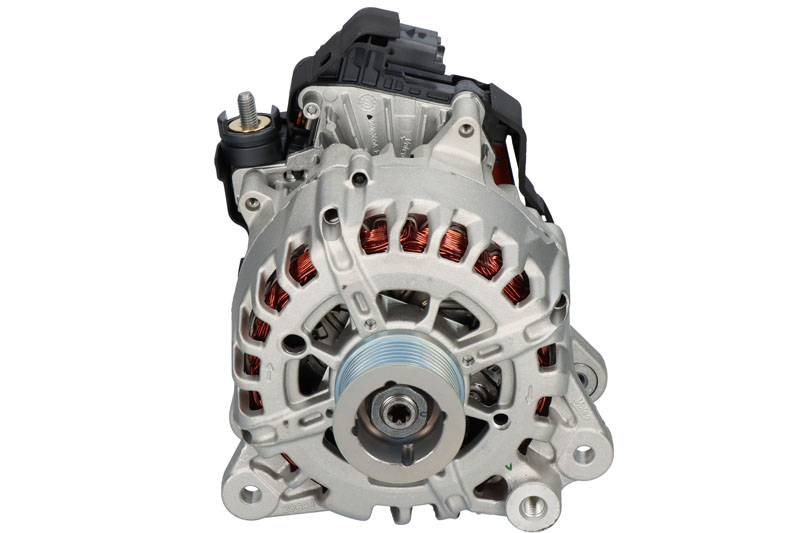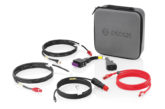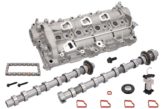
Valeo outlines the role and function of a new piece of technology bringing benefits to the market.
Introducing the smart charge alternator – a game-changer in vehicle technology. Revolutionising the way vehicles manage their electrical systems, a smart charge alternator is designed to improve fuel efficiency and reduce emissions while optimising the performance of the vehicle’s electrical components. Incorporating cutting-edge technology, this intelligent alternator adapts its charging rate based on the vehicle’s electrical demand, thus reducing the load on the engine andconserving energy. Imagine a system that not only contributes to a greener environment but also enhances the overall driving experience by ensuring a stable and efficient power supply to the vehicle’s electrical systems.
Understanding the basics
Vehicle alternators play a critical role in generating the electrical power needed to run various components in a vehicle, such as lights, radio, and air conditioning. They also recharge the vehicle’s battery while the engine is running, ensuring a continuous power supply. Traditionally, alternators operated at a fixed charging rate, often leading to unnecessary energy consumption and increased fuel usage.
The introduction of smart charge alternators marks a significant shift in the way vehicles manage their electrical systems. These advanced alternators are equipped with intelligent charging systems that adjust the charging rate based on the vehicle’s electrical demand. This adaptive approach not only reduces fuel consumption but also minimises the strain on the engine, ultimately contributing to improved overall vehicle efficiency and reduced emissions.
Smart charge alternators are designed to align with the increasing demand for ecofriendly and energy-efficient automotive solutions. By optimising the charging process to match the vehicle’s electrical needs, smart charge alternators represent a leap forward in sustainable vehicle technology.
How they work
Smart charge alternators operate on a sophisticated system that constantly monitors the electrical demand of the vehicle and adjusts the charging rate accordingly. This is made possible through the integration of advanced sensors and control modules that gather realtime data on the electrical load. Based on this information, the smart charge alternator modulates its output to meet the specific power requirements, thereby optimising energy usage and minimising fuel consumption.
The intelligent functionality of smart charge alternators is further enhanced by their ability to prioritise critical vehicle systems during periods of high demand. For instance, when the vehicle’s electrical load increases due to the activation of multiple components, such as the air conditioning system, the alternator intelligently adjusts its output to ensure that essential systems, like the engine control unit and safety components, receive uninterrupted power.
This dynamic and adaptive approach to managing the vehicle’s electrical supply sets smart charge alternators apart from traditional alternators, offering a more efficient and responsive solution for modern vehicles.
Traditional vs smart charge alternators
The primary distinction between traditional alternators and smart charge alternators lies in their approach to managing the vehicle’s electrical power supply. Traditional alternators operate at a fixed charging rate, regardless of the actual electrical demand, leading to potential energy wastage and increased fuel consumption. In contrast, smart charge alternators leverage advanced technology to dynamically adjust the charging rate based on real-time electrical requirements, optimising energy usage and fuel efficiency.
Furthermore, smart charge alternators are designed to prioritise critical electrical systems during peak demand, ensuring that essential components receive uninterrupted power. This intelligent management of the electrical supply enhances the overall efficiency and reliability of the vehicle’s electrical systems, offering a more responsive and sustainable solution compared to traditional alternators.
Advantages
The adoption of smart charge alternators brings forth a host of advantages that significantly impact vehicle performance, efficiency, and environmental sustainability.
One of the key benefits is the improved fuel economy achieved through the intelligent management of the vehicle’s electrical system. By adjusting the charging rate based on demand, smart charge alternators reduce unnecessary energy consumption, leading to fuel savings and reduced emissions.
Smart charge alternators contribute to the overall longevity of a vehicle’s electrical components and battery. The adaptive charging approach minimises strain on the electrical system, thereby extending the lifespan of critical components and reducing the likelihood of premature failures. This not only enhances the reliability of the vehicle but also reduces maintenance costs for owners over time.
Another notable advantage of smart charge alternators is their ability to provide a more stable power supply to the vehicle’s electrical systems. By adapting the charging rate as per the demand, smart charge alternators ensure a consistent and reliable flow of electricity, which is crucial for the seamless operation of various vehicle components. These advantages collectively position smart charge alternators as a significant advancement in vehicle technology, offering tangible benefits for both vehicle owners and the environment.
Testing and diagnosing
To gauge the performance of a smart charge alternator, various diagnostic tests and assessments can be conducted to verify its adaptive charging capabilities and overall efficiency. These tests may involve utilising specialised diagnostic tools to monitor the alternator’s output under different electrical load conditions and assessing its ability to adapt the charging rate in real-time.
Furthermore, conducting simulated scenarios that mimic varying electrical demands, such as activating multiple vehicle components simultaneously, can provide insights into the alternator’s responsiveness and adaptive functionality. This allows for a comprehensive evaluation of how the smart charge alternator manages the electrical supply during practical driving conditions.
By rigorously testing the performance of smart charge alternators, vehicle manufacturers and service providers can ensure that these advanced alternators meet stringent quality and efficiency standards, ultimately benefiting vehicle owners and the environment.
The evolution of Valeo smart charge technology extends beyond alternators, shaping the development of comprehensive electrical systems in vehicles. This includes the integration of smart charging functionality into other electrical components, such as batteries and power management systems, to create a more cohesive and efficient electrical ecosystem within vehicles.









